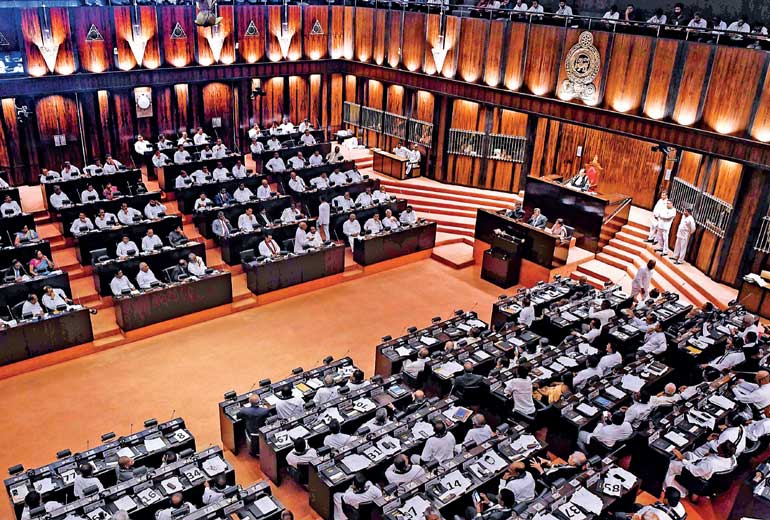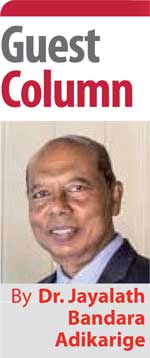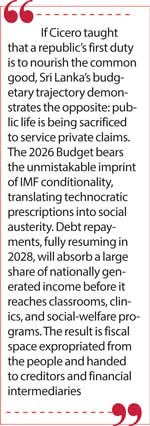Friday Feb 20, 2026
Friday Feb 20, 2026
Tuesday, 28 October 2025 00:22 - - {{hitsCtrl.values.hits}}

A movement elected on promises of transparency, justice, and economic relief has pivoted to elite-friendly arrangements and opaque executive dealing
 Abstract
Abstract
This essay examines Sri Lanka’s political and economic trajectory through the metaphor of “political gravity,” drawing on Eliot A. Cohen’s Newtonian framing and Cicero’s republican ideal that no ruler stands above the law. It argues that power, inflated by illusion, remains subject to accountability’s pull. Reformist promises have turned to elite consolidation, while the rhetoric of sovereignty conceals dependence on IMF-shaped policies. Using Asoka S. Seneviratne’s recent arguments as counterpoint, the article exposes the illusion of independence amid fiscal orthodoxy and social austerity.
Declining investment in education and widening inequality reveal how debt now governs the republic’s moral economy. Official claims of a “zero-corruption culture” are tested against continuing double fuel allowances and hidden asset declarations. The piece concludes that when moral claim diverges from civic reality, political gravity reasserts itself — aligning economic hardship, institutional distrust, and civic frustration into the conditions for renewed republican accountability.
1. Introduction
For two and a half centuries the American ideal has rested on a Roman inheritance: the law stands above men, not men above the law. Cicero and Cato taught that liberty survives only where rulers are subject to the same restraints as citizens. That ideal is what recent “No Kings” protests in the United States seek to defend. It is also the lens through which to read Sri Lanka today, where the language of constitutionalism persists but the practice has been bent into a choreography of spectacle and exemption.
2. Political gravity: Why overreach meets resistance
Eliot A. Cohen, in his essay “Trump can’t escape the laws of political gravity” (The Atlantic, 27 January 2025), argues that however distorted politics becomes, “Newtonian physics and traditional biology still apply.” His metaphor of political gravity suggests that leaders, however inflated by illusion or authority, remain subject to forces of accountability — laws, institutions, and public reason — that eventually reassert themselves [1]. Cohen’s phrasing carries an undertone reminiscent of Johnny Cash’s warning in “God’s Gonna Cut You Down”: “You can run on for a long time, but sooner or later ….” Political gravity, like the song’s moral gravity, is inexorable; it restores weight to words that have drifted free of truth and reminds rulers that evasion only delays judgment.
In Sri Lanka, that gravitational pull now gathers from three directions.
2.1 Expectations betrayed
 A movement elected on promises of transparency, justice, and economic relief has pivoted to elite-friendly arrangements and opaque executive dealing. Stored popular hope converts into equal and opposite disillusionment. The moral energy that lifted a reformist movement now inverts into a social weight pressing against it. Cicero might have called this the republic’s recoil: when promises raised on virtue collapse into expediency, gravity acts not as punishment but as correction.
A movement elected on promises of transparency, justice, and economic relief has pivoted to elite-friendly arrangements and opaque executive dealing. Stored popular hope converts into equal and opposite disillusionment. The moral energy that lifted a reformist movement now inverts into a social weight pressing against it. Cicero might have called this the republic’s recoil: when promises raised on virtue collapse into expediency, gravity acts not as punishment but as correction.
Interlude – Economic reform and the illusion of sovereignty
Asoka S. Seneviratne’s essay “Reform first — growth will follow” (Daily FT, 14 October 2025) — a prelude to his later Colombo Telegraph intervention — situates Sri Lanka’s recovery within a liberal-economic frame that treats structural reform as the precondition for growth. Its logic is disciplined: efficiency, competitiveness, and tariff rationalisation will restore investor confidence and end dependency. Yet the assumption underpinning it — that President Anura Kumara Disanayake has rejected another IMF program — is neither declared nor demonstrated.
As I noted in “Ants’ march, promises, and one-year rule of AKD” (Daily FT, 15 October 2025), the Government accepted the IMF framework almost intact, achieved only a marginal debt haircut, and preserved austerity while proclaiming sovereignty. This timidity, recast as prudence, exposes the gulf between rhetoric and reform. Seneviratne’s liberal logic of efficiency has merit but ignores the political and moral terrain on which reform succeeds or fails. The cautionary experiences of Greece, Argentina, and parts of Africa reveal that externally modelled “reforms” without accountability often entrench, rather than escape, dependency. To celebrate such restraint as independence is to mistake compliance for sovereignty — an illusion repeated whenever economic theology eclipses political truth [2][3].
3. Economic gravity: Debt servitude and social erosion
If Cicero taught that a republic’s first duty is to nourish the common good, Sri Lanka’s budgetary trajectory demonstrates the opposite: public life is being sacrificed to service private claims. The 2026 Budget bears the unmistakable imprint of IMF conditionality, translating technocratic prescriptions into social austerity.
Debt repayments, fully resuming in 2028, will absorb a large share of nationally generated income before it reaches classrooms, clinics, and social-welfare programs. The result is fiscal space expropriated from the people and handed to creditors and financial intermediaries.
The human consequence is visible. According to Human Rights Watch, Sri Lanka spends only 2% of GDP on education — less than half the average for comparable economies. In per-student terms, the country allocates about $ 516, while Morocco spends $ 1,278, Namibia USD 1 711, and the United Kingdom $ 11,192. Education accounts for just 11.7% of the national budget, far below Morocco and Tunisia’s 25%. HRW concludes that “weak tax revenues and debt dependence have crippled public education funding” [4].
This is not merely a fiscal statistic; it is a moral measurement of governance. Cicero taught that the test of a republic is whether it nourishes the mind as well as the market. A state that funds debt before education has already surrendered its republican soul.
Under IMF orthodoxy, small and medium enterprises — the micro-level engines of livelihood — are starved of credit, while large-scale entrepreneurs and rent-seeking intermediaries thrive. The result is a new oligarchy: policy by instruction, profit by connection. It is in this widening gulf between elite continuity and popular hardship that the moral logic of a “No Kings”-style movement becomes visible. When citizens see debt, not law, ruling their future, protest becomes not subversion but self-defence.
The counter-narrative: Managed optimism or manufactured consent?
In a recent column published in Colombo Telegraph, Prof. Asoka S. Seneviratne argues that Sri Lanka’s economic foundations have been permanently repaired under President Anura Kumara Disanayake’s leadership [5]. His article, “The Economy Will Not Collapse in the Future: Response to the Opposition Leader,” insists that the five fault lines that produced the 2022 crisis — unsustainable debt, fiscal mismanagement, policy failure, corruption, and external shocks — “will never reoccur.” It is an argument of restoration, not caution: that discipline, transparency, and moral rectitude have rendered collapse impossible.
Yet the evidence suggests a different gravity at work. Public debt still hovers near 96% of GDP; reserves remain fragile; and the 2028 repayment schedule will divert a significant share of national income to creditors before schools or hospitals see it. To declare that corruption and mismanagement “will never return” is to transform aspiration into ideology. Cicero would have called it a dangerous form of flattery to power — the illusion that virtue can be asserted by decree. Political gravity may pause under rhetoric, but it cannot be repealed.
Asoka S. Seneviratne repeats the claim that there is “no room for corruption” under the present administration no fewer than five times — each offered as self-evident rather than proven. Yet repetition is not verification. Reports show that several ministers and deputies continued to draw two overlapping fuel allowances — from Parliament and their ministries — well into mid-2025, despite vows of austerity [6]. Such duplication exposes the gap between moral claim and administrative reality.
The same opacity surrounds asset declarations, many still unaudited or undisclosed, concealing irregularities beneath the language of probity. What Seneviratne hails as a “zero-corruption culture” is, in truth, a mirage born of moral repetition — a mercer illation sustained by echo rather than evidence. The next part of this series turns to those buried declarations and the architecture of concealment that keeps impunity intact [7].
Trigger conditions for mobilisation
Closing bridge to Part 2
These converging pressures — economic, moral, and institutional — have begun to align into a single gravitational pull. The next part of this essay traces how Sri Lanka’s legal and constitutional architecture either resists or reinforces that pull, revealing why the republic’s moral equilibrium now depends less on new laws than on the restoration of civic virtue.
Footnotes:
[1] Eliot A. Cohen, “Trump Can’t Escape the Laws of Political Gravity,” The Atlantic, 27 January 2025.
[2] Asoka S. Seneviratne, “Reform First — Growth Will Follow,” Daily FT, 14 October 2025.
[3] Jayalath Bandara Adikarige, “Ants’ March, Promises, and One-Year Rule of AKD,” Daily FT, 15 October 2025.
[4] Human Rights Watch, “Broken Promises: Sri Lanka’s Education Crisis and Debt Dependence,” HRW Report, October 2025.
[5] Asoka S. Seneviratne, “The Economy Will Not Collapse in the Future: Response to the Opposition Leader,” Colombo Telegraph, October 2025.
[6] Sri Lanka Mirror, “Four Ministers and Two Deputies Continue to Draw Double Fuel Allowances,” 17 October 2025; Pulseline.lk, “Nineteen Ministers Still Receiving Dual Fuel Allowances,” 18 July 2025.
[7] Author’s forthcoming DAILY FT – No Kings (Part 2): Law, Morality, and the Re-Founding of the Republic, examining unaudited asset declarations and institutional concealment.
(The writer is a political economist and columnist specialising in law, governance, and moral psychology. A former lecturer at the University of Peradeniya, he has published extensively in the Daily FT and continues to explore Sri Lanka’s evolving political and institutional landscape through analytical and interdisciplinary lenses. He can be contacted at [email protected].)